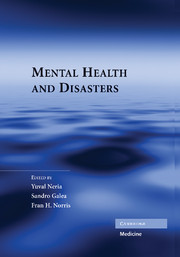Book contents
- Mental Health and Disasters
- Dedication
- Mental Health and Disasters
- Copyright page
- Contents
- Acknowledgments
- Contributors
- 1 Disaster Mental Health Research:
- Part One Concepts
- Part Two Psychopathology After Disasters
- Part Three Vulnerability And Resilience
- Part Four Special Groups
- 12 Women and Disasters
- 13 Child Mental Health in the Aftermath of Disaster:
- 14 Disaster Mental Health in Older Adults:
- 15 The Effects of Disaster on the Mental Health of Individuals with Disabilities
- 16 Factors Associated with Exposure and Response to Disasters among Marginalized Populations
- 17 Journalism and Media during Disasters
- 18 Uniformed Rescue Workers Responding to Disaster
- Part Five Interventions And Health Services
- Part Six Case Studies
- Part Seven Questions and Directions
- Index
15 - The Effects of Disaster on the Mental Health of Individuals with Disabilities
from Part Four - Special Groups
Published online by Cambridge University Press: 07 May 2010
- Mental Health and Disasters
- Dedication
- Mental Health and Disasters
- Copyright page
- Contents
- Acknowledgments
- Contributors
- 1 Disaster Mental Health Research:
- Part One Concepts
- Part Two Psychopathology After Disasters
- Part Three Vulnerability And Resilience
- Part Four Special Groups
- 12 Women and Disasters
- 13 Child Mental Health in the Aftermath of Disaster:
- 14 Disaster Mental Health in Older Adults:
- 15 The Effects of Disaster on the Mental Health of Individuals with Disabilities
- 16 Factors Associated with Exposure and Response to Disasters among Marginalized Populations
- 17 Journalism and Media during Disasters
- 18 Uniformed Rescue Workers Responding to Disaster
- Part Five Interventions And Health Services
- Part Six Case Studies
- Part Seven Questions and Directions
- Index
Summary
Keywords
- Type
- Chapter
- Information
- Mental Health and Disasters , pp. 264 - 276Publisher: Cambridge University PressPrint publication year: 2009
- 14
- Cited by

